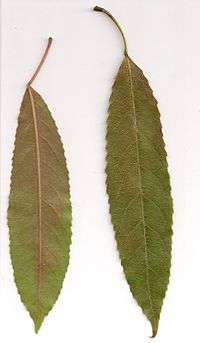Elaeocarpus kirtonii
Elaeocarpus kirtonii is a rainforest tree of eastern Australia. It grows from near Milton, New South Wales (35° S) to Eungella National Park (20° S) in tropical Queensland. It grows in tropical, sub-tropical and warm temperate rainforests. Often seen in cooler and moister sites on volcanic soils and on the richer alluvial soils. Some of the many common names include Silver Quandong, Brown hearted Quandong, Whitewood, Pigeonberry Ash, and White Quandong. The plant was named in honour of W. Kirton, who collected samples of the tree at Bulli in 1885 for Ferdinand von Mueller.
| Elaeocarpus kirtonii | |
|---|---|
 | |
| Elaeocarpus kirtonii growing at Morton National Park, Australia | |
| Scientific classification | |
| Kingdom: | Plantae |
| Clade: | Tracheophytes |
| Clade: | Angiosperms |
| Clade: | Eudicots |
| Clade: | Rosids |
| Order: | Oxalidales |
| Family: | Elaeocarpaceae |
| Genus: | Elaeocarpus |
| Species: | E. kirtonii |
| Binomial name | |
| Elaeocarpus kirtonii | |
| Synonyms | |
| |
Description

A large and often dominant tree, growing to 45 metres tall, and over 2 metres in diameter.
The outer bark is silvery grey and thin, with small pustules. The tree base is significantly buttressed. Another identifying feature is the senescent red leaves. Leaves resemble the Coachwood, being long, thin and serrated. 9 to 18 cm (7 in) long, around 3 cm (1 in) wide. Dull green and very veiny, a long leaf stalk, 2 to 6 cm (2 in) long, swollen where attached to the branch. New spring growth is a brilliant salmon pink colour, most outstanding in the rainforest.
White flowers appear on racemes from January to March, being sweet scented and attractive. Similar to the cultivated Elaeocarpus reticulatus, though in longer racemes.
The fruit is a blue drupe, 10 to 13 mm long with a hard stone like capsule, containing one or sometimes two seeds. Fruit matures from October to January, eaten by a large variety of rainforest birds. Like many Australian Elaeocarpus trees, germination is very slow and difficult, however cuttings prove more successful.
References
- Floyd, A.G., Rainforest Trees of Mainland South-eastern Australia, Inkata Press 1989, ISBN 0-909605-57-2